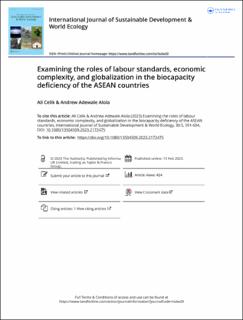| dc.description.abstract | With Singapore currently the world’s most natural capital (biocapacity) deficit alongside four other Association of Southeast Asian Nations (ASEAN) countries having varying degree of ecological deficit, i.e. Indonesia, Malaysia, the Philippines, and Thailand, it then offers a clear justification for a more scrutiny of the ASEAN states’ ecological footprint dynamics. To provide more insight on the drivers of ecological footprint in the overall panel and for each of the above-mentioned countries, the roles of economic complexity, average working hours, labour productivity, labour income share, and globalization were examined by employing the Dynamic Ordinary Least Squares Mean Group (DOLSMG) alongside the recently developed (non)time-variant Granger causality approaches. For the overall panel, the DOLSMGapproach established that labour productivity, labour income share, and globalization reduce the biocapacity deficit by improving ecological quality while economic complexity worsen the region’s environmental quality. Additionally, in the overall panel, there is Granger causality evidence from the average working hour, labour income share, labour productivity, globalization, and economic complexity to ecological footprint. Moreover, the results of the two Granger causality approaches are unanimous in evidence. For instance, average working hours per year is a significant causal of ecological footprint in all the sampled countries at varying periods. Specifically, there are Granger causalities: from labour productivity to ecological footprint in Malaysia, the Philippines, Singapore and Thailand; from globalization to ecological footprint in Malaysia, the Philippines, Singapore, and Thailand; from economic complexity to ecological footprint in Indonesia, Malaysia, the Philippines, Singapore, and Thailand, all at varying times. | en_US |

